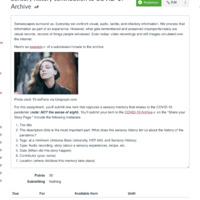Item
Sensory Limitations While Job Seeking in a COVID Environment
Title (Dublin Core)
Sensory Limitations While Job Seeking in a COVID Environment
Description (Dublin Core)
In March of 2020 I made the decision to leave Active Duty Army and pursue a new career in the civilian world. I submitted my resignation and began a six month process to transition out. It was immediately after this drastic step that the effects of COVID-19 on our daily lives began. My state (Maryland) shut down, and my mission essential job that I was in the process of leaving required me to pick up the extra work from at-risk employees. The applications to different government agencies that I had submitted were placed on hold due to the inability of those agencies to conduct in-person events. With less time available, my ability to apply for more jobs was also limited. After a delay of four months, and with only a few more to go before inevitable unemployment, agencies slowly began reinstating their hiring processes. It was at this time that the sensory impacts of a COVID-19 hiring market began to show. Most smaller agencies resorted to telephonic interviews or at the most, video conference calls. Those that did ask for an in-person interview were still heavily controlled with COVID-19 risk mitigation practices. Regardless of the medium enacted, the effects on the senses were the same. Visual senses not withstanding (the inability to see my interviewer was disconcerting, but at least I got to wear jeans), the tactile and auditory senses were also greatly impacted. In every interview conducted pre-COVID, the procedures consisted of shaking hands at the beginning of an interview (i.e. establishing trust through that time-worn gesture), sitting in close proximity to an interviewer with whom you are able to hear clearly, and who can hear you clearly, and in whom you can read facial expressions indicating when you may have said too much or not enough. The interview would then be over and you would seal that act through a final handshake and a smile. None of these basic tenants of interviews occur during a COVID-19 mitigated interview. In my first interview with a federal law enforcement agency, my interview panel and myself were required to wear masks, I was welcomed into the room without any of the standard greetings (handshakes and smiles) and seated behind a plexiglass barrier 8-10 feet from any of the interviewers. Not only did the interview lack the physical interaction that ceremonially marks the beginning and end of the interview, but due to masks, the conduct of the interview was also strained. Questions from interviewers were difficult to hear and understand due to the distance, glass, and masks, therefore requiring awkward repetitions which cast doubt on my competence and confidence. My responses were likewise muffled, which led to doubts as to whether my answers were fully understood by the interviewers. Both assaults on the auditory ability and tactile senses taken for granted in a pre-COVID world lead to an autocatalytic attack on my nerves. The lack of hearing and the absence of a reassuring touch eroded any confidence I may have had going into the interview that would have otherwise remained until I left. COVID-19 mitigation measures reduced what is normally a very personal interaction between human beings to a robotic and numbing experience lacking in all the sensory elements that enables the humanity of an interview. I conducted six more interviews in similar limited sensory manners, eventually evolving my expectations and re-learning a process before finally securing a position.
Date (Dublin Core)
Creator (Dublin Core)
Contributor (Dublin Core)
Event Identifier (Dublin Core)
Partner (Dublin Core)
Type (Dublin Core)
text
story
Controlled Vocabulary (Dublin Core)
English
Social Distance
English
Emotion
English
Public Space
English
Conflict
English
Economy
English
Technology
Contributor's Tags (a true folksonomy) (Friend of a Friend)
sensory history
interviewing
career change
touch
speech
hearing
Collection (Dublin Core)
English
Military
Linked Data (Dublin Core)
Date Submitted (Dublin Core)
1/12/2021
Date Modified (Dublin Core)
1/13/2021
1/20/2021
This item was submitted on January 12, 2021 by Colby Young using the form “Share Your Story” on the site “A Journal of the Plague Year”: http://mail.covid-19archive.org/s/archive
Click here to view the collected data.
